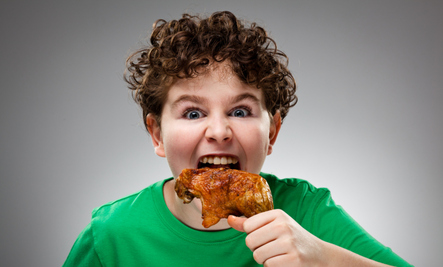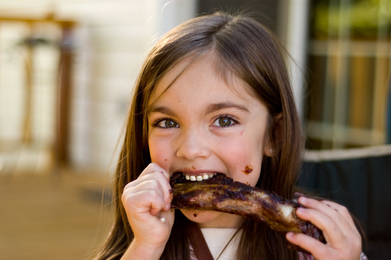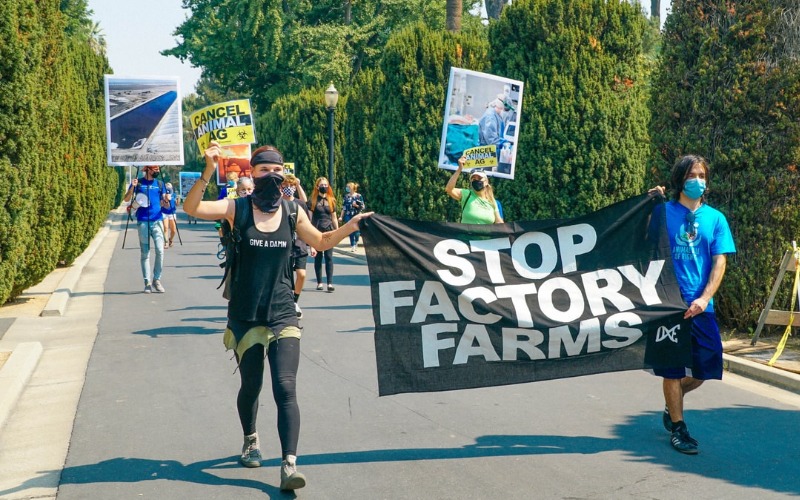Back when I was a kid, my sister (the unrepentant animal lover) made the public declaration to our family that she was now a vegetarian. She was probably 15-years-old, which is old enough to make these sorts of choices without too much parental disdain, but my father begged to differ. While my father was hardly a meat enthusiast, he did relish the opportunity to use his love and trivia, with a bit of evolutionary science, to prove his point. Within a few days of my sister’s conversion to the vegetarian way, my father presented to us a chapter in a book (the name of the book is now long forgotten) that provided graphic illustrations of the human mouth and how the arrangement of our teeth provides evolutionary proof that we humans were meant to be eating meat. My father said the presence of the human incisors was hard-bitten proof that eating vegetables alone would be a disservice to our toothy architecture. Regardless of his persistence, and his illustrative proof, my sister did not budge and remained a vegetarian for several years.
Back then, in the 1980s, being a vegetarian was hardly the norm and barely accepted. Now we live in a far different culinary landscape with a plethora of options for casual and hardcore vegetarians (as well as vegans). However, we also live in a time of sweeping food trends; ones that both reinforce and negate vegetarianism. While not the newest, but maybe one of the more enduring trends to date, is the “paleo diet” which consists of a whole lot of meat-eating. The paleo diet, which is short for Paleolithic, is a lifestyle and diet that adheres to Paleolithic standards, which is short on processed foods, like bread and grains, and quite long on big slabs of beef and pork. Now eating your weight in beef and pork may not seem like a healthy option to anyone (let alone vegetarians), but paleo diet enthusiasts say a steady diet of meat, tubers, root vegetables, and sometimes fish, along with a fair amount of exercise to keep things moving, will provide optimum health and get us back to our ideal form of being. John Durant, who is a paleo diet enthusiast and authoring a book on the diet told NPR, “For millions of years, we didn’t have an obesity problem because we ate foods that our metabolism was adapted to…we were active and lived a healthy lifestyle.”
While many paleoanthropologists admit that we humans did actually evolve to eat meat, and some even contend that a meat-based diet will help us get smarter, many nutritionists contend that too much meat (especially red meat) is a bad bet for personal health. And while there may be virtues to following a paleo diet, the average person doesn’t engage in nearly enough exercise (as our Paleolithic ancestors certainly did) to burn through the caloric and fat intake that comes from such a meat-heavy diet.
What is your read on this Paleolithic approach to eating? Does it make evolutionary sense to eat like our cave-dwelling ancestors, or is it just a shoddy rationalization to eat like a brute?
Can you be Woke and Still Eat Meat?
Remember when Oprah was sued by the National Cattleman’s Beef Association for saying she’d never eaten another hamburger? That was after her interview with Howard Lyman, the “mad cowboy,” discussing mad cow disease. This fourth-generation rancher worked in animal production until 1983. In 1979 he was diagnosed with a spine tumor and changed his ways. He began fighting chemical-based farming and became vegetarian, and then vegan. In addition to co-authoring his books, he became a lobbyist in Washington, D.C., president of EarthSave, and then founder/president of Voice for a Viable Future, a program to educate people about vegetarianism, environmentalism, and organic farming. In the current debate, Lyman argued no, you can’t be a good environmentalist and still eat meat.
Nicolette Hahn Niman is the wife of Bill Niman, founder of Bay Area-based Niman Ranch. Their ranch is all about grass-fed beef, humane treatment for their animals, and small farming. Their story is highly chronicled in the recent Jonathan Safran Foer book Eating Animals. In 2007, Bill Niman left his ranch because of conflicts between the economics of the farming business and the desire to humanely produce meat. Nicolette, herself a vegetarian, even convinced Bill to spare one of their farm’s cows she bonded with. The cow then became their pet. Niman sees nothing wrong with killing animals, as long as they have a “good life” prior to slaughter. She argued yes, you can be a good environmentalist and still eat meat.
According to one blogger’s account of the debate, Lyman kept the upper-hand when it came to the ethical argument against meat-eating. This is believable since Niman seems to be a walking contradiction on that front. Vegetarianism might be a “personal choice,” but it is puzzling how someone can advocate so strongly for humanely raising animals for meat, sell it to others, and still choose not to eat it herself.
But the environmental question is a different ballgame. A small farm can essentially be self-sustaining, with the cows eating grass, fertilizing the grass, and growing more grass to eat. But what about the land needed for this kind of operation? The money (since this kind of farm would inevitably need to charge higher prices for their meat due to producing less than the concentrated animal feeding operations)? The small, though still present, pollution? We’ve told you about the environmental impacts of factory farms, the vast majority of farms in America. But what if small farming was the norm? Is that even a plausible scenario considering how many Americans like to eat meat? Maybe, like Lyman advocates, vegetarianism would do our planet a bigger favor?





